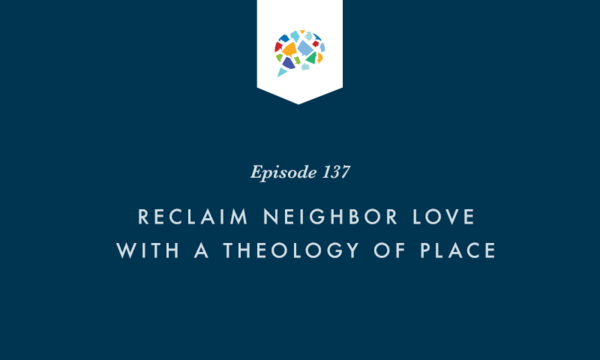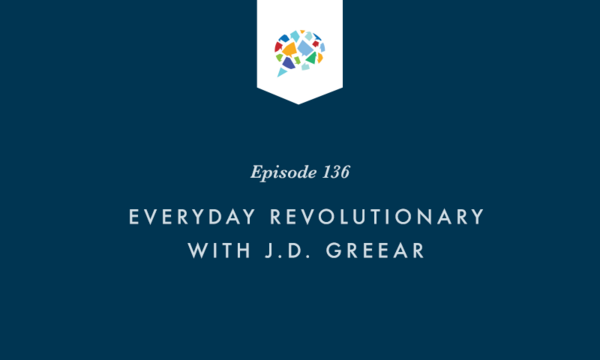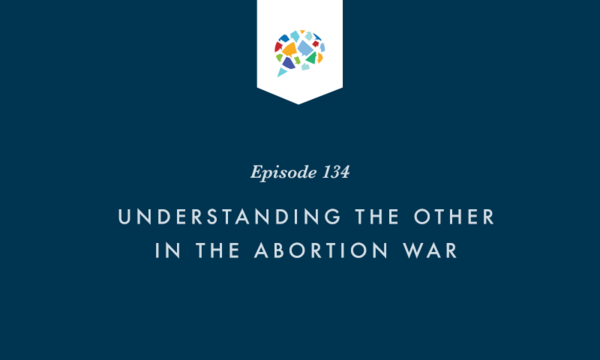
Back in April, to help draw attention to Sexual Assault Awareness month, the Winsome Conviction Project partnered with Biola’s Center for Marriage and Relationships to host a series of events to raise awareness of sexual violence and educate communities on how to prevent it. Chris Grace, co-host of the Art of Relationships podcast, joined with Tim to speak with Nick Drossos, a self-defense expert, on domestic violence, and Nick shares his story of being a victim in an abusive relationship.
Transcript
Tim Muehlhoff: Welcome to the Winsome Conviction Project. My name is Tim Muehlhoff. I'm one of the co-directors along with Dr. Rick Langer and those of you tuning in to hear the Art of Relationships. This is a joint podcast, and I'm back with my good friend, Dr. Chris Grace.
Chris Grace: Yeah, Chris Grace with the Art of Relationships podcast. Tim, it's good to see you.
Tim Muehlhoff: It is good to see you. Now, the reason we're doing this together, Chris, is because our guest today is one that we both wanted and we thought, let's not split the man in two. That will be ugly. Let's have a joint podcast because we just feel like this topic is going to be one people need to hear, and I think it's going to be a unique podcast with a unique perspective.
Chris Grace: Yeah. Defensive tactics expert, Nick Drossos. Nick-
Nick Drossos: You got it, Drossos.
Chris Grace: Drossos baby. Nick all the way from Canada. Thank you for joining us today, man, and driving, well, not driving, but probably flying all this way and taking time to talk about a topic that really we don't talk about much. And you have found yourself right in the middle of something that's pretty deep, pretty powerful and pretty transformative for a lot of guys when they hear your story.
Tim Muehlhoff: So one thing that we've been doing is something called the Neighbor Love initiative. The Center for Marriage and Relationship has been doing this for a long time, Nick. We go work with a group called OC United, and we help women that are caught in abusive relationships. We teach them life skills, self-defense skills. I'm also a level two instructor under Nick in defensive tactics.
Nick Drossos: Yeah, we both are... Well, you are...
Tim Muehlhoff: One of us is. Listeners, you can determine who that is. And so when we deal at these centers, obviously the idea of abuse, domestic violence comes up. But often what doesn't come up is that it's not just men to women. And Nick, you found yourself in the situation as a self-defense instructor and expert that kind of was shocking.
Nick Drossos: Yeah, it was one of these things that I never thought I would ever be in this position. I've been teaching self-defense for close to 20 years. I've worked with women who've been raped and domestic violence. I've seen it. Right? I've lived it. I've trained them. I've worked with them. I've understood their mindset. And then I was put in that situation many years ago where I was in a very toxic relationship. And for some reason, and I know why the reason's today, I was insecure. I attracted these type of women that were somewhat verbally abusive or emotionally abusive. I hadn't yet got to the point where I understood myself well enough to know why am I attracting these women. And then what really it hit me and I said, okay, I'm doing something wrong, is the first time it got, and the only time it got physical in this particular relationship, where we got into an argument and it escalated to the point where she started becoming physically violent.
Now, to me, violence is violence. That means if you slap a woman or push a woman, the moment you put your hands on her, it's considered violence. Just like she has a right to call the police and have you arrested. Well, it's the same for the men. I look at it both sides, violence is violence, so I'm not going to play the victim like I got out of there hurt. But she pushed me. She smacked me. She challenged me to fight. She wouldn't let me leave the house. She continued to just pursue me with the intention of, hit me, fight me. And I remember thinking, I can't believe this is happening to me and I know all she wanted in that moment was for me to strike her.
Now, I remember thinking, and I told her, I'm a self-defense instructor. This is what I do. You want to fight me? And I'm freaking out. But then I'm just thinking, Nick, and thank God I have all these years of martial art experience where I was just breathe. Just breathe. Just breathe. And then I... It's hard for me to say this. I remember I closed my eyes and as I tried to go into the room, I went to the bathroom, I closed my eyes and I closed my ears and I breathe, breathe, breathe and as she's yelling at me, I could hear my mother and I'm just thinking, if I turn on that switch, I'm going to hurt you.
Chris Grace: Yeah. Nick, just an amazing story. We hate to interrupt it, but I want to hear the end and this idea of breathing. But I keep thinking to myself, here's somebody that knows what to do, here's somebody that teaches others what to do and yet you found yourself so amped up that literally you kind of forgot your training at that moment or you kind of used your training, but you were like, I could explode at any minute.
Nick Drossos: Any minute. And I was like the thing is, like Tim says, what do I want to do? I want to get out of the house. I want to leave. I'm actually very calm right now. I'm trying to deescalate as much as I could but I mean the door, she's pushing me, she's following me to the point that when I ran into the bathroom, I was going to close the door just so she doesn't come in. And then again, in my head, I'm like, I can't believe this is happening. All I'm thinking is Nick, do not lay one finger on her because I know how the story's going to go. And again, there's that whole emotional and psychological, and again, some of my childhood was in that.
Chris Grace: Yeah. Let's talk about that real quick. What does that mean, you attracted women like that? I mean, obviously you must have come from an abusive or a situation with your mom where violence was okay. How do you think that... I mean was it just like you felt like you were attracted to these women or they saw something in you, or have you thought about it, why these women?
Nick Drossos: I did, and I've never really talked about this openly because it's nobody... I don't want to say how my mom was, but my mom today, I realized at almost 47 years old, and I probably have figured this out when she was around 42, 43, she's mentally probably borderline personality, paranoia. She's mentally ill and sometimes I try to say, Nick show compassion, but it's hard. But we were raised in not so much physical, but verbal and emotional abuse and the highs and lows, "I love you." And two minutes later, "I hate you. I regret the day you were born," then, "I love you." And when you're a kid, you don't understand that.
Chris Grace: No.
Nick Drossos: Right. And it could make sense why I did many things in my life where I'm like, okay, this is why. And I attracted these toxic type of relationships. And what I did at one point, I wrote down all the women I dated and what they all had in common. I said, okay, what do they all have in common? Okay. I said, Nick, write a new formula, what do you want? And I'm happy today. I'm in a relationship it's been four years with a complete different relationship, the completely opposite of everything I've ever attracted. But one last thing, the hardest thing for me to do is come out and talk about this. That was the hardest thing.
Tim Muehlhoff: But we need to do it because statistics show you're not alone, Nick. Like for instance, in your blog, you said, according to the National Coalition Against Domestic Violence, one in four men has experienced violence from an intimate partner. So it's not that you're alone, it's just never gets talked about. It never gets expressed.
Chris Grace: And that number, let's talk about that number. Right? That's 20% have experienced. That's 20% that report that they've been experienced.
Tim Muehlhoff: Right. Good point.
Chris Grace: I mean, there are men that are never going to report this because it's just the opposite of what society thinks. And again, by far, the vast majority of people who are abused are females in a male female relationship. But 20% that are, you experience that we're probably looking at closer to almost double that because half of the people aren't going to say anything.
Tim Muehlhoff: Right.
Nick Drossos: I could tell you when I put that blog up and I shared it, two people, acquaintances, people I know, they're not close friends, but I know them. I used to hang around with them when I was kids wrote to me and said, "Nick, I loved your blog. This happened to me." They both shared their story. But they were both so embarrassed to talk about it because who wants to go tell his friend, Hey, man, this weekend my girlfriend smacked me a few times. And to me, again, one smack, that's enough. That's the red flag for you to get up, pack your stuff and leave.
Tim Muehlhoff: Yeah, absolutely.
Chris Grace: Nick, when you wrote your list of people you had dated, was there any commonality on there? Was there anything that now you look at? So here's a listener going, oh, okay. What did he put on there that would help him next time avoid it? Was there a certain trait of these women that you seem to be attracted to or?
Nick Drossos: See I won't lie, and maybe it's going to make me sound shallow myself, but I own it myself. Girls were very beautiful.
Chris Grace: Yeah. Beautiful.
Nick Drossos: Pretty, into themselves. And this type of women, my girlfriend's gorgeous. She's beautiful, but she doesn't represent that.
Chris Grace: Okay.
Tim Muehlhoff: Right.
Nick Drossos: You know what I mean? So there was that. It was-
Chris Grace: So maybe you didn't look beyond that level, was that what it was?
Nick Drossos: I did as well. But again, I find that for men, we look at that and I'm also looking at, okay, we see the red flags when we push them away, we're like, ah, the red flag? It's nothing. She'll change. She'll be better. You know what I mean? Looks, obviously, I wanted somebody independent, somebody who's kind, and I mean, you can't have everything. And then people tell you, well, that's what relationships are. That's how they are. Don't be so picky. No, be picky. Be picky. Don't just settle.
Tim Muehlhoff: There's another statistic. What was it, 20 per... I teach a gender class on how are we raised with this gender expectation like men looking for a certain type of woman have been fostered to do that. What was it? 25% of women, 35% of men say violence is a normal part of a relationship.
Nick Drossos: Physical violence.
Tim Muehlhoff: Physical violence, verbal, physical, emotional. Why? They've been conditioned that way. They've been brought up in a culture that sometimes even glorifies it, I'm thinking of the... Oh, come on. What's the... Fifty Shades of Gray franchise which not only took it, but in a weird way, romanticized it and normalized it, which, I have abuse in my family background as well and that is just unforgivable to take that, normalize it and make it sexy. That's unforgivable. But it has an effect on people living in that kind of world.
Nick Drossos: Especially the young generation.
Tim Muehlhoff: Oh, yeah especially young generation.
Chris Grace: Young generation, that's right.
Nick Drossos: All this social media. I look at my son, he's 14.
Tim Muehlhoff: Oh, he accepts it it as normal?
Nick Drossos: It's normal. And what's unbelievable is that this younger generation want things to be done to them because of what they see, what they hear and I think, especially, we talk about it as well in our talk show, all the porn accessible and everything they see, it distorts your mind and what being intimate with a partner is.
Chris Grace: Yeah, and check out some of our podcasts on pornography and its effect on the brain. But I think Tim, even that idea, that notion abuse is more than just hitting and laying a hand on somebody, right?
Tim Muehlhoff: Right, that's so good Chris.
Chris Grace: It's that yelling at, it's that emotional intimidation that you said and I think a lot of men, while it may never escalate to physical violence, there's still abuse going on if you are being ridiculed and criticized and yelled at and love is withheld from you.
But I think, Nick, your story goes one step further in that she laid hands on you and you tried to avoid this. I just want to applaud you, first of all, for coming out and talking about it. I know it's not easy. Right when you said the story, bunch of your friend and you wrote your blog, friends came to you, even as you and I were first talking about this, I recalled a quick incident when I'm in the dorm dating this girl briefly. Well, I teased her in the middle of some guy standing there, and she just reached out and slapped me.
In one respect I guess that's a natural reaction to being teased, maybe inappropriately. But what it did was they laughed at me and I remember thinking, okay, that's weird. I don't like that. I would never do that. And you said, "Imagine if I hit her like that?"
Nick Drossos: Yeah.
Chris Grace: The difference would be profound in some respects in the response. They would look at me, I know even my guy friends back then would've went, what did you just do? For her it was almost funny and I think that started... That relationship obviously didn't last very long. But Nick, I think that's the thing that happens with men in situations like this is they become unsure of themselves. And you seem like you're like, what hap... Is this right? Is this true?
Nick Drossos: But there's a buildup to it and I say this, it starts with a snarky remark. Then it starts with a little bit of verbal abuse, not much.
Chris Grace: A jab.
Nick Drossos: A jab. Oh, you're such a-
Tim Muehlhoff: Put down or-
Nick Drossos: You're such a loser-
Tim Muehlhoff: Or swearing up and using derogatory.
Nick Drossos: You're so dumb or whatever. And then it builds to... It's a slow buildup. People will test, how much can I push you before I crack you? Then it's going to get, and then physical. It might be a push, a slap,
Chris Grace: Maybe a playful at first.
Nick Drossos: Playful at first. And then at the end there's a buildup because I'm testing, how far can I take you before... I'm setting the limits. I'm testing you out. And it's interesting, Tim, because when I train women who are in these type of situations, guys are like, "Well, why don't you just leave him? Just get up. Take your stuff."
Tim Muehlhoff: Right.
Nick Drossos: And here I am, a guy, a man. I have my own business. I do well. I had my own other house, and it still took me a few months before I can,
Chris Grace: Gather your stuff.
Nick Drossos: Gather my stuff, because there's kids involved and other...
Tim Muehlhoff: Yeah.
Nick Drossos: It wasn't like, all right, I'm out. It still took me a few months to prepare my exit. So I say, imagine a woman who's got two kids. The man has all the finances under his name. He controls everything. It's not as easy and there was something that this experience taught me that when I train women to be able to see, I know where you're coming from. I can't compare because I'm not here to play the victim. That's why when we wrote the blog, I'd wanted to make sure I don't come out as like, oh, poor me. No, that's not it. I wanted to share that that small incident still happened to me. It does happen to men and it's more common than we think. And what can we do to also talk about it? Because I'm sure there's other men who probably get it 10 times worse and they're afraid to say something.
Tim Muehlhoff: Yeah.
Chris Grace: Man and you had both the yourself and your relationship, but then the dynamic of children that now women can say, yeah, welcome to our world. What am I going to do? Pick up the kids and run out and go sleep on the streets? And you're like, I can't leave these kids or I don't want to or it's used as a tool against you.
Tim Muehlhoff: So we work with a group called OC United, the Center for Marriage and Relationships and the Winston Conviction Project. Donna said, if you want to get a glimpse of what it's like, watch the Netflix series, Maid.
Nick Drossos: Maid?
Tim Muehlhoff: Maid, M-A-I-D.
Nick Drossos: Yeah.
Tim Muehlhoff: And the first episode, I literally called her and said, is this what it's like? And she said, "It's the closest thing I've ever seen of a woman trying to leave and how incredibly hard it was to leave financially, emotionally." And it was stunning to watch. So real quick, Chris, how they found out more information about the center?
Chris Grace: Well, yeah. You go to cmr.biola.edu and then you can look up many of the events. We're hosting a number of things, Tim, with you guys at all times during the year.
Tim Muehlhoff: Right.
Chris Grace: Physical abuse, mental, verbal, emotional, how to tell the difference, how your family of origin comes into play, and then ways to help. And I think that's, Nick, why we're just so glad to have you here and do this podcast together is because you've lived this and you have a background that is invaluable.
Tim Muehlhoff: So Nick, how can they find the blog that we've been talking about? How would they find that? And even you have great online resources, how would they find that? Listeners.
Nick Drossos: They can go to my website, nickdrossos.com. So they could go into the blog section and they're going to find it. As well as they can, when they visit my website, I have courses, knife defense, gun defense, women self-defense courses, and a lot more.
Tim Muehlhoff: And I can testify it's really good stuff and I'm a level two instructor with Nick's Defensive Tactics program. You can find out more about the Winsome Conviction Project by simply going to winsomeconviction.com. There's a whole catalog of all of our podcasts. We have free material you can check out.
Here's what we're going to do, Nick, in the next session, we're going to step away a little bit from domestic violence, because I'm thinking of you in that bathroom with your heart racing. What can our listeners do to deescalate? You mentioned breathing, and we don't want to just throw that out there and leave it. Breathing is a first step that all of us need to think about when our heart starts to race and we feel like I'm getting upset here. So we're going to kind of leave the domestic violence realm because we live in what Deborah Tannen calls The Argument Culture today, and we need to find out ways of stepping back. So Nick, will you join us for one more segment?
Nick Drossos: Absolutely, Tim. I'd love to.
Tim Muehlhoff: Sounds great.
 Biola University
Biola University





